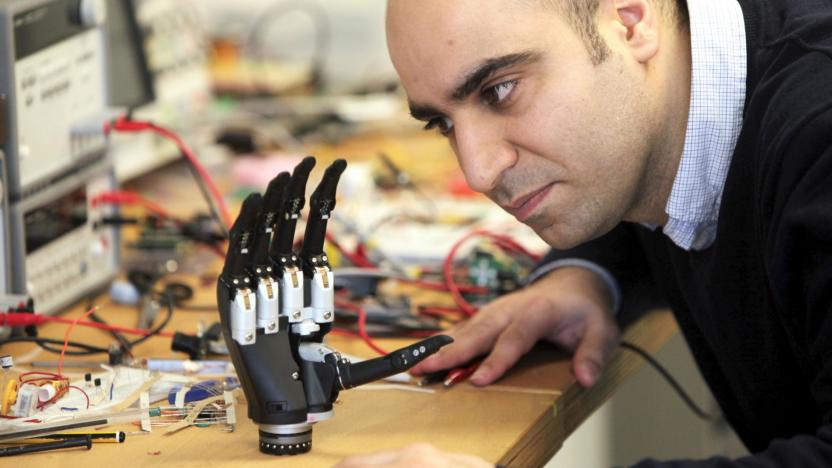Newcastle University
Latest

'Intuitive' prosthetic hand sees what it's touching
Even as we begin to wire prosthetics directly into our peripheral nervous systems and wield Deus Ex appendages with only the power of our minds, many conventional prosthetic arms are still pretty clunky, their grips activated through myoelectric signals -- electrical activity read from the surface of the stump. The "Intuitive" hand, developed by Dr Kianoush Nazarpour, a senior lecturer in biomedical engineering at Newcastle University, offers a third approach. It uses a camera and computer vision to recognize objects within reach and adjust its grasp accordingly.

Newcastle University neuroscientists use video game for stroke rehab
Video games aren't neuroscience, unless they're helping stroke victims recover physical function in a scientific, medical capacity: then they're totally neuroscience. The above video shows off Circus Challenge, an action game from Newcastle University and Limbs Alive Ltd designed to help stroke patients regain motor control of their weakened hands and arms.Circus Challenge uses "next-gen" motion controllers – not the Wii, as other rehab systems have – to have patients fling pies at clowns, juggle, dive and perform other Big Top-inspired feats, with the difficulty progressing as motor skills improve. Newcastle received £1.5 million from the Health Innovation Challenge Fund for its project, and hopes to use the funds to provide remotely monitored, at-home therapy for stroke patients.Aside from all the philanthropy and innovation in the Circus Challenge project, we think the game design is pretty pretty as well. Check it out for yourself up top.

Newcastle University preps in-car GPS for the elderly, helps grandmum get home safely
Most Engadget readers will have grown up with GPS, but the UK's Newcastle University has realized that many in the older generation might be first-timers and unfamiliar with all those keep-lefts and turn-rights. Development is underway at the school for a new satellite navigation system that would be easier and more intuitive for your grandfolks, with features that include calling out direction changes by landmark names, limiting turns to the safer variety and keeping the route off of high-speed motorways. When this might come to your local high street shop isn't known, but the university has a £12 million ($19.5 million) research grant to help sort that out.

BinCam posts photos of your trash on Facebook, shames you into recycling (video)
We're not sure how comfortable we are with everyone online being able to examine our, as the Brits would say, "rubbish." But our friends across the pond are apparently ok with it, seeing as it's the home of BinCam -- a research project out of Newcastle University that posts pictures of people's trash on Facebook. At the heart of the experiment is an Xperia X10 Mini strapped under the lid of a garbage can that automatically snaps a photo every time it's opened and closed. That image is then uploaded to the BinCam Facebook app, where you're showered with public shame for failing to sort your recyclables or celebrated for not wasting food. And, just in case you think this is all an elaborate joke, check out the BBC report after the break the the study of how it affected student behavior at the source.

Silicon carbide sensors developed for transmitting inside volcanos
There's one serious obstacle to volcano research: volcanos, like, shoot lava. Sure, you could aim a thermal camera at one from a safe distance, but where's the fun in that? On the other hand, researchers at Newcastle University are developing silicon carbide-based components for a device that they say will be able to withstand 900° Celsius temperatures -- just the thing to sense what's going on inside a volcano and transmit the info in real-time. Not only will this allow researchers to better understand conditions leading up to an eruption, it might also someday signal an eruption before it occurs. "At the moment we have no way of accurately monitoring the situation inside a volcano," says NU's Dr. Alton Horsfall. "With an estimated 500 million people living in the shadow of a volcano this is clearly not ideal." Since silicon carbide is more resistant to radiation than plain ol' silicon, the tech can also be used inside nuclear power plants or even as radiation sniffers in places that might face a terror attack.



